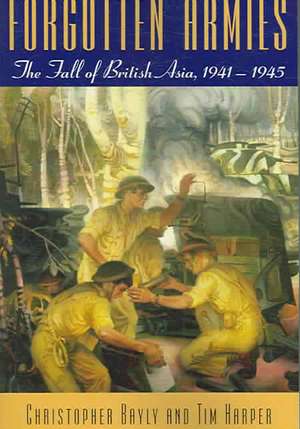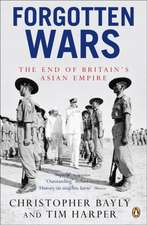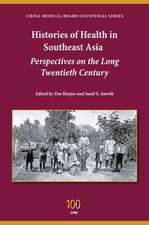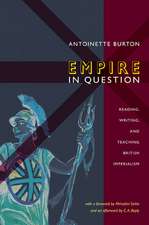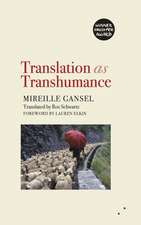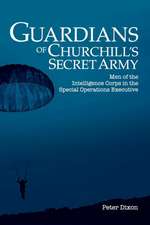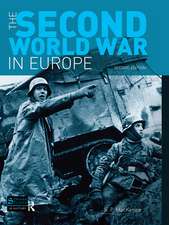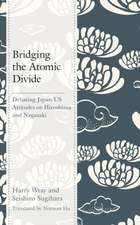Recenzii
This is a spectacular book: in its scope, encyclopaedic knowledge, understanding of southeast Asia, and the light it throws on a neglected subject, the struggle for British Asia...The battle for British Asia has been largely ignored compared to the war on the western front. It is also a history that has been overwhelmingly told in British terms. The authors deploy their intimate knowledge of the region to provide us with a very different story. Southeast Asia is a region of enormous complexity, a rich tapestry of races and cultures. As the Japanese forces carried all before them, the authors describe the way in which people were mobilised and how the various responses became powerful determinants of the final outcome. -- Martin Jacques The Guardian 20050122 [This] work casts new and important light on a shadowy aspect of the Second World War, which deserves to be better understood. -- Max Hastings Sunday Telegraph 20040912 This book looks at the waning days of the British Empire in its Asian crescent, stretching from India through Malaya and down to Singapore, as social, political, and military cataclysms shook the region during World War II. Bayly and Harper evoke a drama involving millions--'forgotten armies' of soldiers, laborers, native guerrillas, political activists, and refugees propelled throughout British Asia during the war, thus uniting what had been isolated and moribund colonial enclaves. As war engulfed these enclaves, the entire colonial society was routed, killed, or captured. This laid bare forever the myth of European mastery and transformed the way natives of the region saw themselves. The subsequent Japanese occupation inspired a deeply rooted culture of resistance and shaped the ensuing nationalist struggles for independence after the war. The authors have performed a valuable service by giving us a comprehensive, multifaceted account of these events. Both erudite and engrossing, this work is highly recommended. -- Edward J. Metz Library Journal 20050215 A work at once scholarly and panoramic, it is as precise in dissecting, say, the logistical problems the Japanese Army confronted during the 1944 campaign in northern Burma ('the worst defeat in Japan's military history') as it is arresting in examining such sweeping events as the 1942 trek of some 600,000 Indian, Burmese and Anglo-Indian refugees from Burma through the high passes of Assam into India, fleeing the advancing Japanese. Hundreds of monographs have examined aspects of this story, but Bayly and Harper's is the only history that matches the scope and nuance of novels like J. G. Farrell's Singapore Grip, Paul Scott's Raj Quartet, Anthony Burgess's Enemy in the Blanket, Orwell's Burmese Days, and Amitav Ghosh's Glass Palace. Their 70-page prologue is a triumph of scene setting...The ignominious British and Australian rout down the length of the Malay peninsula (the retreating soldiers sardonically adopted the theme from the Hope and Crosby movie The Road to Singapore as their marching song) and Singapore's subsequent fall have already been described, memorably, in Farrell's novel and in a host of military histories, most notably Alan Warner's Singapore 1942, but Bayly and Harper's account is both vivid and authoritative. One of their greatest contributions lies in their stinging appraisal of the debacle. -- Benjamin Schwarz New York Times Book Review 20050417 Bayly and Harper's often-overlooked topic is the fate of Southeast Asia--particularly India, Burma, Malaysia and Singapore--during the war. The authors focus on the experiences of the people of those countries, caught between the warring imperialists, callous British and brutal Japanese...Forgotten Armies is superb at evoking the wretchedness of this region, at conjuring the hardships its people suffered (including the deaths of some 3 million Indians in the terrible Bengal famine of 1943-44) and at demonstrating how Burmese, Indian, Malaysian and Singaporean nationalism were galvanized by these experiences. Bayly and Harper also deserve credit for presenting a complete history of the war in Southeast Asia: They are just as scrupulous--and just as good--at explaining the strategy of the British and Japanese commanders as they are at describing the lot of average soldiers and the misery of the civilian populations. In this important work, a reader will meet a vast range of characters whose stories are rarely heard in the United States, including Japan's brilliant Gen. Tomoyuki Yamashita, who overcame the supposedly impregnable British bastion at Singapore; the Indian nationalist Subhas Chandras Bose, who threw his lot in with the Japanese only because he hated the British more; the tens of thousands of women forced into prostitution by the Japanese; and the courageous Indian troops who repelled the Japanese at Imphal and Kohima in northeastern India in 1944. -- Kenneth M. Pollack Washington Post Book World 20050605 A panoramic chronicle of the war in South Asia ranging from swank prewar Singapore to famine-ravaged Bengal, where three million people died in 1943-1944...This is a brilliant marriage of social and military history and a work of extraordinary literary merit. -- Benjamin Schwarz The Atlantic 20051101 The aim of this important and fluent book is to recover the history of "the connected crescent of land between Calcutta and Singapore" --including eastern India, Burma, and Malaya--during the years of war and (for much of it) of Japanese occupation. The book's emphasis is on the experiences of indigenous peoples, civilian as well as military, as much as on their colonial rulers, and as much on political, social, economic, medical, and cultural developments as on the military campaigns themselves. In all this, it is strikingly successful...Christopher Bayly and Tim Harper have unearthed much new material...and achieved immediacy through truly prodigious research in archives in Britain, Malaysia, and Singapore...This is an outstanding book, and a very significant addition to our understanding of this period. The authors are to be congratulated on the scope and depth of their erudition, the skill of their writing, and the subtlety and sophistication of their analysis. This book is likely to remain the standard work on the subject for many years to come. -- David Omissi American Historical Review This book's theme is in its subtitle -- a nuanced study of the collapse of the century-and-a-half-old British imperium in South Asia, out of which came the South Asian world of today...Reynolds has researched this fascinating story with meticulous care. It is hard to believe there are any relevant documents or secondary sources he has missed. The evidence is marshalled clearly and the result is a first-rate case study, not only of the tension that lay, barely concealed, under the surface of the Anglo-American alliance, but of the problems that powerful covert action agencies can pose for their creators. -- Raymond A. Callahan International Historical Review Christopher Bayly and Tim Harper...have produced a moving and harrowing account of Britain's darkest hour in Asia, as Malaya, Singapore, and Burma fell to the Japanese in the early years of the pacific war. Forgotten Armies tells the story of this fall in both a scholarly exacting way, drawing upon hundreds of diaries, letters, archives, and interviews, and with great narrative flare...This is a book that should be read by all students of modern Southeast Asian history. Aside from its meticulous indictment of colonialism and imperialism, its elegiac honoring of the forgotten victims of war and its compelling narrative quality indeed, this is a scholarly book that I trust would appeal to general audiences demonstrate how Japanese ideologies of "race," "language," and "nation" were influential in the rise of pan-Islamism, Malayan nationalism, and Burmese nationalism. -- Andrew C. Willford Indonesia Compellingly written, profoundly well-researched...It sets out to convey a story largely unknown to Western readers and it vividly accomplishes this using source material that allows Asian voices to speak for themselves. -- Steven Schwamenfeld Chinese Historical Review 20070401 Truly magnificent...Forgotten Armies is the finest history of this region (and our country) that I have read. I cannot recommend it highly enough. -- Kam Raslan Malaysia Star 20070826 Forgotten Wars movingly brings out the travails of ordinary people who got caught up within a vicious cycle of political turmoil, economic deprivation,and violence. This is a "must read" for those interested in histories of British imperialism and decolonization in Asia and those who would like an introduction to the comparative regional histories of nation-states in Southeast Asia after 1945. -- Haimanti Roy Journal of British Studies 20080401
